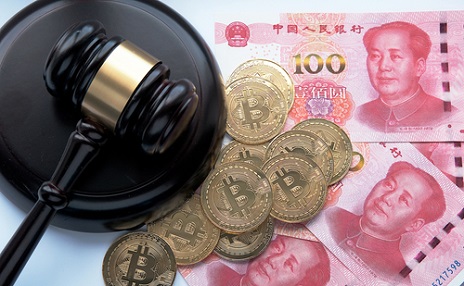Play-to-earn gaming investments are not protected by law, China court determines
Editor’s Note: With so much market volatility, stay on top of daily news! Get caught up in minutes with our speedy summary of today’s must-read news and expert opinions. Sign up here!
(Kitco News) – The Shanghai Qingpu District Court in China has issued a ruling that investments in play-to-earn (P2E) games like Axie Infinity (AXS) are not protected by law in a court case that was settled on Tuesday.
The case in question revolved around a 700,000 yuan (US$101,700) investment that the plaintiff Li Guang made to the defendant Wang Meng, who operated his own game operation studio and team. The focus of the team was to earn crypto rewards by playing Axie infinity, a popular P2E that rose to prominence during the bull market run of 2021.
According to a report posted on WeChat, the money invested by Li was meant to fund the equipment and in-game assets needed to play the game and earn rewards. All rewards earned in Axie Infinity are paid out using the platform’s two native tokens, AXS and Smooth Love Potion (SLP).
During the first month following Li’s initial investment, he received a profit of nearly 80,000 yuan, which led to a deeper level of trust in Wang Meng and his team. At that point, Wang Meng asked Li to increase his investment to help with operating costs and increase the income generated.
But the situation soon changed as the crypto market ran into a rough patch which led to a decline in asset prices. As the value of AXS and SLP declined over the course of 2022, Wang sold the cryptocurrencies held in the game accounts managed by his team without informing Li and pocketed 110,000 yuan ($18,240) in profits.
When Li went to check on the funds held in the accounts he funded, he was shocked to find that all of his money was gone except for the 80,000 yuan profit he previously received after the first month.
Wang eventually agreed to repay a total of RMB 113,000 to Li from the proceeds of the token sales, which the pair deemed to be a loan. But when Wang failed to make payments at the agreed-upon time, Li filed suit with the court demanding that Wang return the loan of 113,000 yuan.
The Shanghai court ultimately ruled that the 700,000 yuan investment was not protected by law, but the defendant must return the 110,000 yuan profit to the plaintiff, which was regarded as property lost due to misuse.
In December, the Supreme People’s Court issued a batch of “guiding cases” which included a ruling by a court in Shenzhen that transactions between cryptocurrencies and fiat are not permitted. Under the current regulations in China, all cryptocurrency-related investments and their derivatives are not protected by law.
Interestingly, while cryptocurrency trading is prohibited in China, a ruling made in September determined that cryptocurrencies themselves can be protected by law as virtual assets. Despite the country’s ongoing ban, data from Chainalysis shows that China is ranked tenth on the firm’s global crypto adoption index.
Disclaimer: The views expressed in this article are those of the author and may not reflect those of Kitco Metals Inc. The author has made every effort to ensure accuracy of information provided; however, neither Kitco Metals Inc. nor the author can guarantee such accuracy. This article is strictly for informational purposes only. It is not a solicitation to make any exchange in commodities, securities or other financial instruments. Kitco Metals Inc. and the author of this article do not accept culpability for losses and/ or damages arising from the use of this publication.
Credit: Source link


 Bitcoin
Bitcoin  Ethereum
Ethereum  Tether
Tether  XRP
XRP  Solana
Solana  Dogecoin
Dogecoin  USDC
USDC  Cardano
Cardano  Lido Staked Ether
Lido Staked Ether  TRON
TRON  Sui
Sui  Avalanche
Avalanche  Toncoin
Toncoin  Wrapped stETH
Wrapped stETH  Shiba Inu
Shiba Inu  Chainlink
Chainlink  Wrapped Bitcoin
Wrapped Bitcoin  Stellar
Stellar  Hedera
Hedera  Polkadot
Polkadot  WETH
WETH  Bitcoin Cash
Bitcoin Cash  LEO Token
LEO Token  Uniswap
Uniswap  Litecoin
Litecoin  Pepe
Pepe  Hyperliquid
Hyperliquid  Wrapped eETH
Wrapped eETH  NEAR Protocol
NEAR Protocol  USDS
USDS  Ethena USDe
Ethena USDe  Aptos
Aptos  Internet Computer
Internet Computer  Aave
Aave  Mantle
Mantle  Cronos
Cronos  POL (ex-MATIC)
POL (ex-MATIC)  Ethereum Classic
Ethereum Classic  MANTRA
MANTRA  Render
Render  Monero
Monero  Bittensor
Bittensor  Artificial Superintelligence Alliance
Artificial Superintelligence Alliance  Dai
Dai  Tokenize Xchange
Tokenize Xchange  Filecoin
Filecoin  Arbitrum
Arbitrum
Comments are closed.